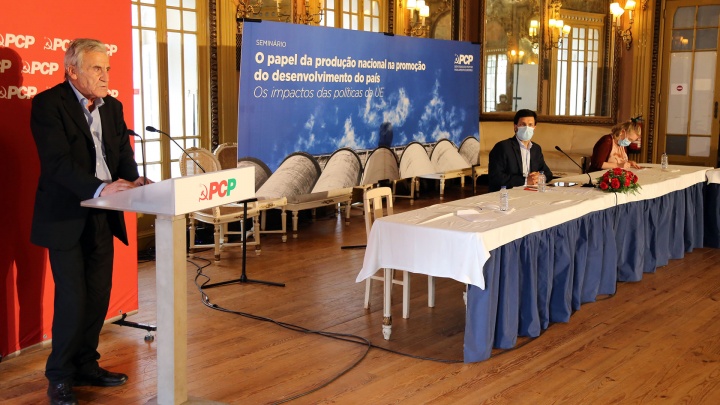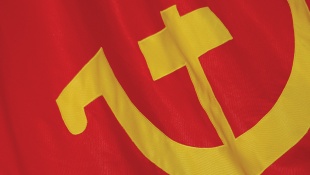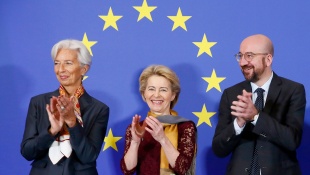I would like to start by thanking you for your presence as well as valuing the set of interventions made here on a central issue for the country's development, for the well-being of the Portuguese people, for the future of Portugal as a sovereign nation – the defence and development of national production. Far, far from the concerns of successive governments and far, far from the interests of the economic and financial elites and the monopoly groups that support them, is this need to defend the national productive apparatus, to replace imports by national production, to cut down external dependence and create jobs with rights.
The PCP not only never abandoned this essential axis of the alternative policy it proposes to the Portuguese people, but life proved and proves it right when it is seen that there is no solution to national problems without a reversal of the policy of abandoning national production. An axis that made the commitment and proposal stronger while capitalist integration into the European Union was worsening the situation and the national subordination to the single market and the impositions of the Euro made this struggle more pressing and demanding. Making the country no longer dependent on the surpluses of the great powers, in deficit and eternally in debt, despising the domestic market and whose exports are subordinated to the interests of the large multinationals, are patriotic objectives to be achieved.
A country that reduces its debt by increasing the wealth it manages to create. That preserves and uses its resources judiciously, that creates qualified, stable and well-paid employment, that ensures the essential needs of its people, that responds to environmental concerns.
A policy with such objectives is a demand of the present and of the future for which we will continue to strive.
But it is a great illusion to think that such a path can be taken without a confrontation and rupture with the impositions of the European Union, whether they are accompanied or not by EU funds that, it must be said, have never compensated, nor will they compensate for the destructive impacts that the EU itself and its policies have had on national agriculture, fisheries and industry. If there were any doubts, here we have the Portuguese Presidency of the Council of the European Union, taking place in this first half of 2021, whose guidelines, topics under debate and perspectives confirm, as illustrated here, the complete submission to the great interests, whether those of multinationals or those of the great powers.
And when some, seeking to disguise their high responsibilities in the situation the country has reached, call for the so-called "structural reforms", which is to say, for more attacks on workers' rights, public services, social security, and more handouts to big capital, here we leave them this suggestion: if there is a reform or structural change that is more urgent and that the country needs most, it is the one that enables guaranteeing the replacement of imports by national production and this so necessary and demanding reform does not find a solution with the current policies of the PS, but also of the PSD and CDS and their surrogates.
One of the buzzwords that currently run through the discourse of the PS government, as well as that of the PSD and CDS, is that of «reindustrialisation». Covid brought to the political debate, with all the acuity and urgency, the deficits and shortages of the country and of the EU in industrial and agri-food products, so simple as masks or medical equipment such as ventilators.
Faced with the drama of the shortages that the epidemic has highlighted, we have seen, out there and here, the Prime Minister exclaim: «We cannot be as dependent on external supplies as we have been until now. Things as banal as masks cannot come from countries that are thousands of kilometres away». This unexpected apprehension with the country's de-industrialisation was followed, then, by successive plans putting forward solutions that are no solution at all, including the Recovery and Resilience Plan.
On the part of the PSD, the sudden discovery of de-industrialisation was no different. Very recently, the text «Priorities of Portuguese industry» by a gathering of notables from the PSD was made public, in which the names of ministers of the Governments of Cavaco Silva stand out, including some who produced a vast «theory» to justify the destruction of large national metalworking or heavy chemical companies, and the relocation of dozens of other manufacturing industry units. It was globalisation, they said. The modernisation of the country involved the «dematerialization of the economy». The country had to turn to services. The EU single market would bring us the food and industrial goods we needed! And as they declared solemnly and in unison, with the adhesion to the Euro, the Republic would no longer have problems with foreign payments! The result is well-known: a gigantic foreign debt and dependence on strategic, industrial and agricultural goods, like cereals! Today, we do not even produce the railroad tracks anymore – because of the destruction of Siderurgia Nacional steelyards!
In fact, this apparent inversion of opinions is remarkable, which, once again at the behest of the EU, is now reappearing around the «re-industrialisation of Europe». This discourse is, however, far from practice, since the destruction of national productive assets continues. In the name of a so-called energy transition and a reputed fight against climate change, the Sines and Pego Thermoelectric Power Plants close and, an unforgivable economic crime, move towards the liquidation of the Matosinhos GALP Refinery. This will mean a significant loss of exports of marketable goods. And not just petrol and diesel, but raw materials such as bitumen, toluene, xylenes, etc., which other Portuguese companies, namely pharmaceuticals and chemical industries, will start importing!
They are the same ones who now speak of «re-industrialisation», who pretend not to hear the workers of Vale do Ave clamouring against the closure, in a strange business, of one of the largest and historic textile companies in the country, Coelima. The same ones who claim or decree the privatisation of Efacec, certainly to hand it at a bargain price, after being salvaged with public funds, to some financial fund that will see in it, above all, money signs, and even less the strategic importance of a company with a strong technological, innovative and exporting profile and with a key role in the national economic fabric!
And the attack on the national productive sectors is ongoing and does not stop with the industry. It continues in the persistent war against national milk producers, calling into question one of the only agri-food products in which the country is self-sufficient. It continues with manoeuvres on National Agricultural Reserve (RAN) and National Ecological Reserve (REN) to transform agricultural land, which is scarce in the country, into photovoltaic panel gardens or, with the same objective, the destruction of forest areas that they say are carbon sinks, including the liquidation of the production of raw materials of the important national pulp industry. As can be seen, re-industrialisation is underway! But moving backwards…
Faithful to a fight that has also lasted for decades, the PCP affirms that the path must be different.
It is necessary for the Portuguese State to assume the role of strategic planner undertaking the development of the Portuguese productive fabric, the production of goods and employment, alleviating production deficits and boosting exports of high added value, with a high incorporation of national production. Without waiting for this to result from market fluctuations (which does not mean to call into question its role) or from the moods of foreign investment, increasingly financial capital, always waiting for generous tax benefits and EU funds. Or that the country's reindustrialisation results from a European Division of Labour, based on the Single Market oiled by the Euro, according to the interests of the great powers and the multinational capital that manages them. The new industrial strategy announced by the European Commission in apparent response to the problems of EU’s industrial production, laid bare by Covid-19, with the refocusing of value chains on the borders of member states, may serve Germany and other countries of the Directorate, but do not serve our country!
It is necessary for the Portuguese State to assume an active role as promoter and operator of industrial assets, without devaluing private initiative and the market, enabling to overcome years and years of delays and damages caused by right-wing policies. Also moving towards public control of strategic sectors, decisive supports of all economic activity, such as energy and telecommunications, today dominated by oligopolistic groups, fundamentally of foreign capital, collecting profits and rents that cost dearly to the national economy.
It is necessary for the State to put an end to the wheeling -dealings and manoeuvres with important national companies, including public concessions that they hold after the privatisation processes, segmenting them, selling them in slices, as was the case with six EDP dams, or with the sale by GALP of Galp Gás Natural Distribuição, SA
We have been insisting on a central issue: the need to replace imports with domestic production.
We have clearly identified four areas where this replacement is strategic: food, medicines, means and equipment for transport; energy. Areas that in turn involve multiple industrial sectors that already exist or to be created in our country.
Many accompany us in this comprehensive concern. But what can be seen is the government's abdication of its implementation.
Let us look at a very concrete example. The PCP publicly presented a project to rebuild the national production capacity of trains. The government said it wanted to achieve the same goal. A grouping of entities interested in this possibility was created. But what happens in concrete? The few trains being built for the Lisbon Metro are being produced in Valencia. Why? Because the government did nothing that was necessary to make it possible to face the reconstruction of the national productive capacity of trains. It just went shopping, instead of planning the maximum national incorporation in assembly, in the manufacture of components, in the maintenance and repair of equipment. Doing so requires resisting pressure from the European Union and its multinationals. As is necessary when this requires us to invest the funds received in the construction of the infrastructure but not in the trains that will circulate in it, ensuring that what is profitable is handed over to the sector's multinationals and only what brings losses is guaranteed by the State.
Another example is fishing. We are the third largest per capita fish consumer in the world. We have the largest exclusive economic area in the European Union. We import more than €2 billion worth of fish a year. Why? Firstly, because our governments are tied to the European Union's Common Fisheries Policy. But essentially because there is no investment in the national fishing fleet, no investment in marine research, no improvement in the working conditions of fishermen.
Look at the scandal with the IPMA research vessel. It was at a standstill for years, without the proper funding, without the proper crew, without a corps of non-precarious researchers, without carrying out the necessary missions. And now we look at the RRP and what do we see? Measures to guarantee the technical and scientific staff for its functioning? No! The promise of buying another ship and the concern to pay an extra 10 million to make it compatible with the use of green ammonia.
And with this example, we are not devaluing environmental issues. Just saying that we are building the house from the roof down!
Everything points out that the quotas for sardines, for example, which have stifled the national purse seine fishing, should have already been increased. But we lacked the scientific data to prove the empirical appreciation of those who are in the sector. Millions of euros were lost because hundreds of thousands were not invested in time to enhance the national scientific capacity of which this type of vessels is an example.
As we have defended, the country needs to invest and invest a lot to turn the page in defence of national production. It needs to use EU funds, including the RRP, also for this purpose, it needs the State Budget to support a significant increase in public investment on a lasting basis, around 5% of GDP. It needs goals and objectives that ensure the country's self-supply of strategic products, from pharmaceuticals to milk and cereals, from boats to trains. It needs production that actually incorporates environmental concerns, reducing distances between production and consumption, combating programmed obsolescence, ensuring direct public investment in planning the country's energy supply, just as it is necessary to invest and articulate production with the response to social, economic and ecological needs, from the outset in the entire transport sector, whether in metropolitan areas or in the rest of the national territory where the offer of public transport is scarce.
Producing, creating wealth and employment is a condition for the survival of the Portuguese homeland. Portugal needs to make up for lost time. It needs to overcome the delays and dependence to which a disastrous policy in favour of the great economic and financial interests has condemned it. This is the time to assume a policy and an alternative path and resolve national problems. A time of great challenges that must be overcome!


